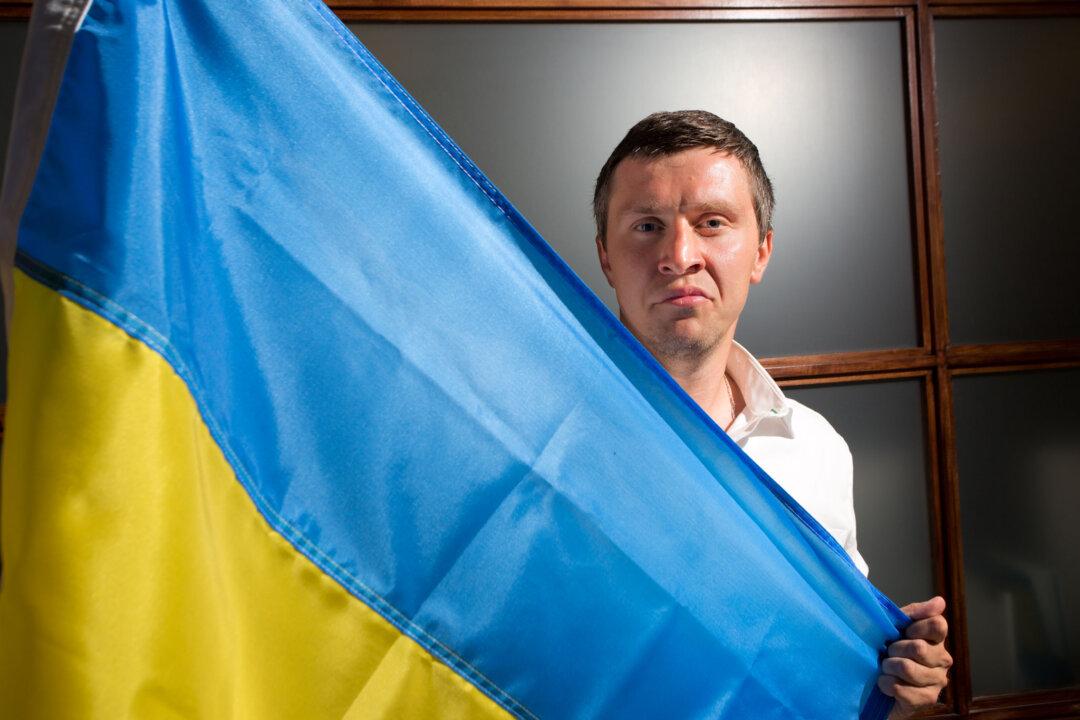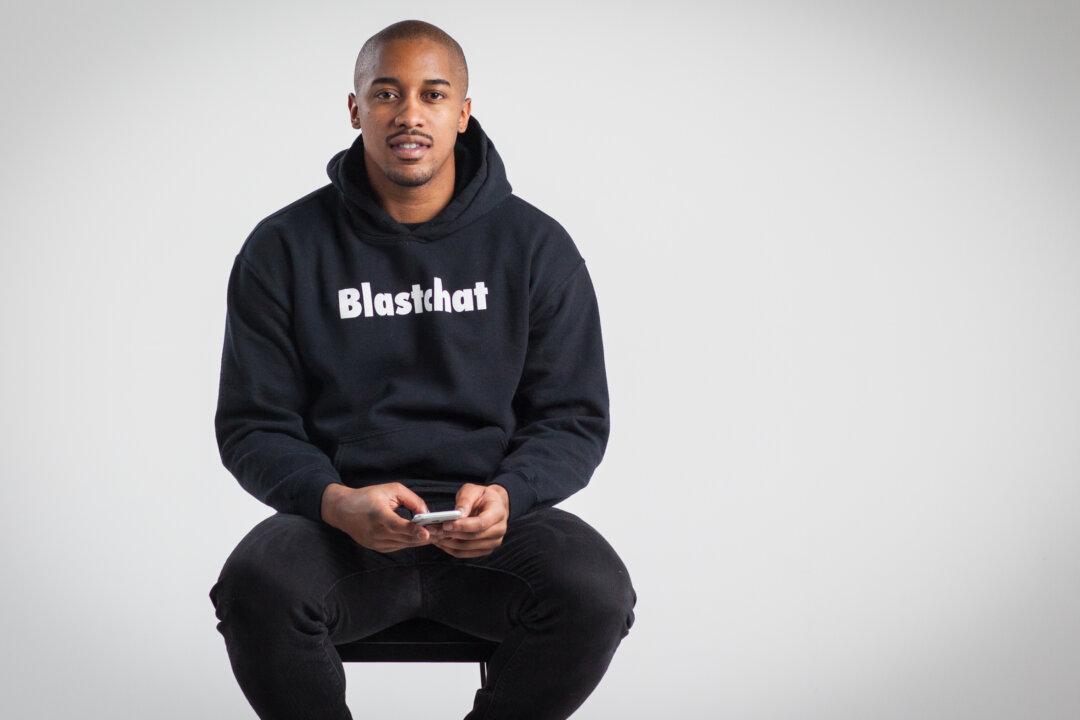It was a bitter, cold night on Dec. 25, 2013, in Kyiv, Ukraine; the wind howled as Ivan Rodichenko and his friend exited the barricades of Maidan, the central square where they had spent the entire day protesting the failure of Ukraine’s leaders to accept closer integration with Europe. Maidan was the focal point of civil unrest involving bloodshed and violence that went on for months.
As Rodichenko was getting into his friend’s car, a stranger appeared from behind and struck him hard in the head. Five more men appeared and attempted to stronghold him out of the car.
The bulky men, dressed in athletic clothing, were known as the “titushky,”—former prisoners and gang members hired by the now impeached Viktor Yanukovych government to assault protesters.
Rodichenko clutched the car door with one hand, and shielded his face from punches with the other, while the men yanked at his legs.
Amid a whirlwind of strikes, stabs, and smashes, Rodichenko heard the engine start, and then abruptly stop. His heart sank. The men were pulling his friend out of the car too.
There was a series of starts, stops, and starts again; until finally, in one inexplicable moment, his friend kicked the men off and the car zoomed into the darkness. Rodichenko survived the attack with bruises and a concussion.
At least the child safety lock was on for the car’s back doors, his friend said to him. If the men had gotten inside from the back, he was most certain they would have been killed.
Need to Flee
A friend who worked in law enforcement told Rodichenko that he needed to leave the country, for the government was not happy with how active he was on social media. Rodichenko was a public relations specialist and the owner of an entertainment company. For both the Orange Revolution and the recent Ukrainian protests, Rodichenko had been using his connections with artists to get support.
“I was told I would die if I stayed in Ukraine,” Rodichenko said. “I am on a marked list.”
Rodichenko left for New York on Jan. 7, Ukraine’s Christmas Day. He had originally planned to stay for just a few weeks visiting an aunt who lived in the Rockaways until the situation cooled off back home. But tensions escalated in January, as police began to open fire on the protesters.
It was then that Rodichenko, 34, decided to apply for refugee status. It was a painful decision that led to a four-month separation from his wife and 3-year-old son. But on May 30, he received a letter saying that his application was denied. Ukraine has a new elected government that ended the strife in Maidan. Things should be safe for him now, the letter implied.
Rodichenko was not so sure, but in the course of 16 days he had to decide whether he would file for an appeal—which meant an additional two-year separation from his family—or return and continue his activist work in Ukraine.
In the United States, he met congressional members and protested in Washington. He found solidarity with the Ukrainian Congress Committee of America. He founded the American European Solidarity Council, which consists of a number of European-Americans who fear their countries could also be threatened by Russia.
“He’s a humble and honest man,” said Andrij Dobriansky, the vice president of the New York branch of the Ukrainian Congress Committee of America. “He said he’s not a hero, the heroes are the ones who died in Ukraine. But he is doing all that he can for the movement in the U.S.”
As he was deciding whether he would stay or go, he reviewed the course of events that had led him to where he is today, its dangers, and why he got involved in the first place.
Higher Stakes
Rodichenko is the owner of Show Time Studio, an artist booking and event management agency. His work required him to travel frequently.
When he traveled through small towns in Ukraine, he often saw poverty amid lavish mansions where the oligarchs lived. “It was more apparent once you left the capital,” he said. “I saw towns completely impoverished.”
He was doing business in Cyprus when the first violent crackdown on protesters occurred on Nov. 30. As he watched the bloody student protesters on the news, something inside him unhinged. He told his partner that he needed to return to Ukraine. He was supposed to be with these protesters.
He had gotten artists to perform at the Maidan during the 2004–2005 Orange Revolution, but this time artists reacted differently.
“They said ‘Are you crazy? There are hundreds of people marching around with hammers, there are pro-Putin gangs hired to attack people,’” he recalled.
“What they said was true,” Rodichenko said. “As I stood at the Maidan defenseless, I felt as if I was standing in the middle of a war zone.”
Maidan’s Early Days
As Rodichenko looked out the window at the thickening sheet of snow, his wife said, “No, absolutely not.” He could not go to the Maidan, it was likely that he would be killed.
At 4 o'clock in the morning on Dec. 11, 2013, when his wife and baby were fast asleep, Rodichenko received a call from a friend at the Maidan. He said he was gathering a group to patrol the perimeters. Rodichenko decided to go; he could not put it off any longer; this was what he returned to Ukraine for.
He put on a snowboard helmet, ski goggles, and as many layers of clothing as he could possibly fit and walked out into the biting winter air.
In the middle of the night, Ukrainian pop star Ruslana’s voice was heard on a loud speaker. But she was not singing, she was yelling “Rise up Ukraine, rise up,” as church bells echoed from St. Michael’s Cathedral domes.
It was surreal to see Vitali Klitschko, the former heavyweight boxing champion, who went on to become the new mayor of Kyiv, standing in the middle of the street and negotiating with the police for a wider pathway.
“There were rows and rows of storm troopers and riot cops. A question on everyone’s mind was, ‘When will they start attacking?’” Rodichenko recalled.
The police did not openly attack people right away, but people began to disappear. There were mangled bodies found in the forests surrounding Kyiv.
In the weeks that Rodichenko went to the Maidan, he got to know people there. People had different jobs. Some watched over the barricade, others gave first aid. There was an old man who served tea.
“He was there every day to keep the protesters warm,” he said. “Then, he stopped coming one day.”
Rodichenko asked his family where he went. They did not know.
Uncertainties in a New Ukraine
Despite the dangers, Rodichenko found strength in the unity that he experienced at the Maidan.
He remembered standing there, arms linked with other protesters, as they blocked the police from getting past. He remembered the sensation of the guards’ metal shield pressed against his face in the winter. He remembered being face to face with a policeman wearing a face shield, and how the officer avoided looking into his eyes.
Alone, he may not have had the courage to do that. But with the group, together they rose to the occasion.
“It was thousands of people coming together in the freezing cold,” he said. “There were actors, pilots, musicians. Everyone came to support.”
“Sure, there were a small subset of rowdy people who threw rocks and cocktails,” he said. “But it’s propaganda that said all of the people who went to the Maidan were rowdy.”
On June 11, he boarded a flight to return to Ukraine.
“We are very worried about him,” said Yelena Tokar, his aunt in New York. “There are a lot of leaders still missing, and there were many people who followed Ivan.”
Rodichenko plans on joining an NGO when he gets back. He may even run for office, even though he said that will most likely endanger his life further. Either way, he wouldn’t find it fulfilling anymore to go back to his comfortable career in entertainment.
He boarded the plane with apprehension, but also hope.




